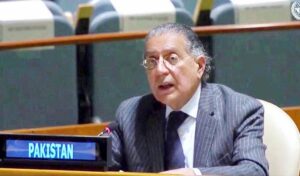
VETO RESPONSIBLE FOR NON-RESOLUTION OF KASHMIR, PALESTINE ISSUES: MUNIR AKRAM
UNITED NATIONS: Pakistan has told the UN General Assembly that it considers the veto power vested in the Security Council’s five permanent members an important issue that needed to be tacked as part of the 15-member Council’s reform to make it more effective.
During a debate marking the one-year anniversary of the UN Assembly’s resolution that requires the permanent members of the Security Council to justify their use of veto power, Ambassador Munir Akram stated that the council has been unable to act due to the strategic rivalries of its permanent members and their use of veto power. This has prevented the resolution of longstanding disputes such as those in Kashmir and Palestine and hindered the implementation of UN resolutions.
The Pakistani envoy emphasized that the issue of veto power must be addressed as an integral part of the Security Council’s reform and not separately. The 2022 Assembly’s resolution, which was adopted unanimously, requires the General Assembly to convene within ten days if any of the five permanent members exercise their veto power, according to state news agency reports.
During his remarks, Ambassador Akram stated that the abolition or regulation of veto power by permanent members must be a crucial part of Security Council reform. Therefore, Pakistan, along with the Uniting for Consensus (UfC) group, opposes the addition of new permanent members to an expanded Security Council.
The Pakistani envoy argued that increasing the number of permanent members and veto powers would increase the likelihood of paralysis and inaction in the Security Council. However, the Group of Four countries (India, Brazil, Germany, and Japan) continue to push for permanent seats, while the UfC group led by Italy and Pakistan opposes any additional permanent members. As a compromise, the UfC has suggested creating a new category of members with longer terms but without permanent status.
Currently, the Security Council comprises five permanent members and ten non-permanent members elected to two-year terms. Ambassador Akram emphasized the negative impact of the veto power and suggested balancing it by imposing restrictions on its use and enhancing the role of non-permanent members with more extended and perhaps more frequent representation.
- Kashmir Martyrs day - July 24, 2024
- Heroic Hearts: Remembering Kashmir’s Martyr - July 24, 2024
- Burhan Wani: The Icon of Kashmir’s Resistance - July 11, 2024






